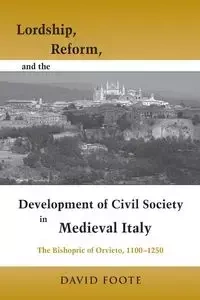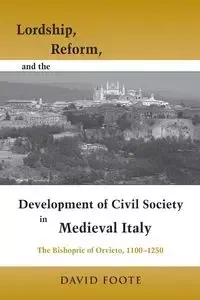Lordship, Reform, and the Development of Civil Society in Medieval Italy - David Foote
Lordship, Reform, and the Development of Civil Society in Medieval Italy - David Foote
- The Bishopric Of Orvieto, 1100-1250
AutorzyDavid Foote
EAN: 9780268028725
Symbol
632FUW03527KS
Rok wydania
2004
Elementy
270
Oprawa
Miekka
Format
15.2x22.9cm
Język
angielski

Bez ryzyka
14 dni na łatwy zwrot

Szeroki asortyment
ponad milion pozycji

Niskie ceny i rabaty
nawet do 50% każdego dnia
Niepotwierdzona zakupem
Ocena: /5
Symbol
632FUW03527KS
Kod producenta
9780268028725
Rok wydania
2004
Elementy
270
Oprawa
Miekka
Format
15.2x22.9cm
Język
angielski
Autorzy
David Foote

In his examination of the bishopric of Orvieto from 1100 to 1250, David Foote reveals how three defining developments of the High Middle Ages-the feudal revolution, ecclesiastical reform, and state building-played out in a typical medieval Italian commune. He challenges scholarship that overemphasizes the secular nature of Italian city-states by showing the extent to which developments in ecclesiastical institutions provided a model for the formation of civic institutions and defined a commune's political and religious culture. Following the collapse of Carolingian authority in the tenth century, Italy experienced a period of political chaos. Rural lords, unrestrained by central authority, fought to dominate the countryside. Bishoprics, by virtue of their temporal and spiritual authority over dioceses, emerged in the midst of this disorder as the most effective institutions for rebuilding political authority at the local level. The Orvietan bishopric formed the center of an urban coalition attempting to conquer and pacify their contado, or surrounding countryside. Orvieto's bishopric assisted the early city-state in administering its territory by developing innovative methods of written administration and record keeping. As the center of a wide range of religious interests, the bishopric was often caught between competing political and religious actors who leveraged their interests through ecclesiastical institutions and resources. This interaction had a profound effect on the city's political and religious culture. As Orvietans struggled to define the norms that would govern their society, they had to adapt their quest for political power and autonomy to their religious values. David Foote's deeply researched new book illuminates the process of state building in its early stages and the formation of political and religious culture in Europe during the High Middle Ages.
EAN: 9780268028725
EAN: 9780268028725
Niepotwierdzona zakupem
Ocena: /5
Zapytaj o produkt
Niepotwierdzona zakupem
Ocena: /5
Napisz swoją opinię

